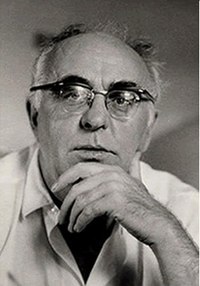Charles Olson
| Charles Olson | |
|---|---|
 |
|
| Born |
27 December 1910 Worcester, Massachusetts |
| Died | 10 January 1970 (aged 59) New York City, New York |
| Resting place | Gloucester, Massachusetts |
| Language | English |
| Nationality | American |
| Education | B.A. and M.A. at Wesleyan University |
| Genre | Poetry |
| Literary movement | Postmodernism |
| Notable works | The Distances, The Maximus Poems |
| Spouse | Constance Wilcock, Betty Kaiser |
| Children | Katherine, Charles Peter |
| Relatives | Karl (Father), Mary Hines (Mother) |
|
|
|
Charles Olson (27 December 1910 – 10 January 1970) was a second generation American poet who was a link between earlier figures such as Ezra Pound and William Carlos Williams and the New American poets, which includes the New York School, the Black Mountain School, the Beat poets, and the San Francisco Renaissance. Consequently, many postmodern groups, such as the poets of the language school, include Olson as a primary and precedent figure. He described himself not so much as a poet or writer but as "an archeologist of morning."
In 1951, Olson became a visiting professor at Black Mountain College in North Carolina, working and studying here beside artists such as John Cage and Robert Creeley. He subsequently became rector of Black Mountain College and had a second child, Charles Peter Olson, with one of his students, Betty Kaiser. Before his divorce from his first wife finalized, Olson married Kaiser.
Olson's ideas came to deeply influence a generation of poets, including writers such as Denise Levertov, Paul Blackburn, Ed Dorn and Robert Duncan. At 204 cm (6'8"), Olson was described as "a bear of a man", his stature possibly influencing the title of his Maximus work. Olson wrote copious personal letters, and helped and encouraged many young writers. He was fascinated with Mayan writing. Shortly before his death, he examined the possibility that Chinese and Indo-European languages derived from a common source. When Black Mountain College closed in 1956, Olson settled in Gloucester, Massachusetts. He served as a visiting professor at the University at Buffalo (1963-1965) and at the University of Connecticut (1969). The last years of his life were a mixture of extreme isolation and frenzied work. Olson's life was marred by alcoholism, which contributed to his early death from liver cancer. He died in New York in 1970, two weeks past his fifty-ninth birthday, while in the process of completing The Maximus Poems.
...
Wikipedia
